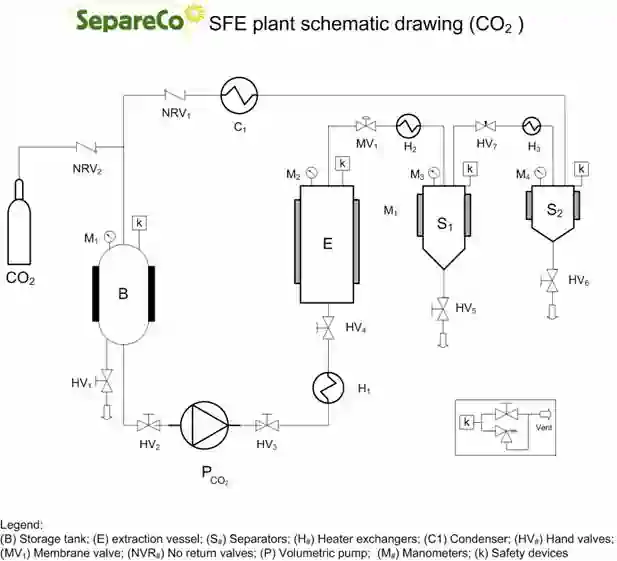Extraction par fluides supercritiques (EFS)

SFE is an alternative compared to the classic separation systems like fractionated distillation, steam current distillation, solvent extraction or thermal desorption. SFE can be applied to systems on a different scale: from lab-scale, analytic (from few hundreds milligrams to few grams of sample) or preparative (few hundreds grams of sample), to the pilot scale (kilograms of matrix), up to the industrial scale treating tons of raw material (e.g. in the coffee decaffeination process).
SFE can substitute many traditional extraction processes from vegetable matrices for the obtainment of dry extracts or essential oils with specific characteristics. The extraction of substances from complex mixtures, in particular, can be made highly selective modifying properly the operational temperature and pressure conditions, in order to adapt them to the Solubility of the different components of interest. An example is the terpenes removal from the essential oils from citruses and other officinal plants, through which a mixture of aromatic components stable to light and temperature is obtained (generally monoterpenes are not, and sometimes they contribute in no way to the smell).
On the basis of such premises, SFE progressively imposed itself as one of the elective technologies for the treatment, with different goals, of several raw materials of alimentary, pharmaceutical and cosmetic interest (active principles extraction and officinal herbs components extraction). Although theoretically there are many supercritical fluids available for the purpose, CO2 is the Fittest. In fact it is non toxic, inert, non flammable, cheap, recyclable and environmentally harmless. CO2 extraction is a modern extraction technology for hydrophobic vegetable components realized according to a clean procedures without release of any residue nor solvent substances.
After the extraction the operation pressure is lowered and the CO2 loses its solvent power releasing the solute substances, which are available in a concentrated and pure form. For these reasons FDA marked this process as GRAS (Generally Recognized As Safe). Natural substances, moreover, usually are not very stable at high temperatures, and need to be kept at temperatures next to the environmental one: CO2’s critical temperature is 31°C, making of it particularly fit as solvent for biologic substances. Proteins, carbohydrates, inorganic salts or metals are not co-extracted in any way. CO2 extracts are microbiologically stable and do not need particular storage conditions, because given their nature they are practically sterile. Unlike conventional procedures, the Extraction Selectivity is Specific.
The method does not involve thermal stress and does not need organic solvents.
